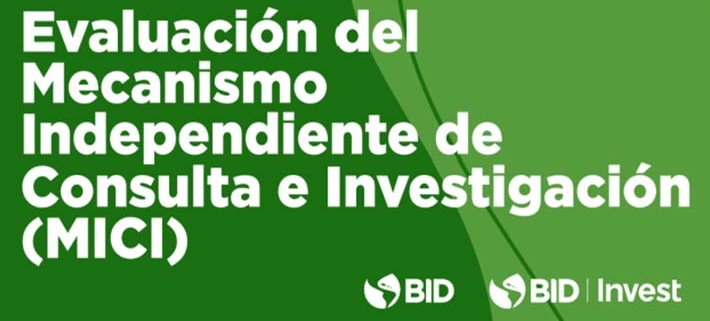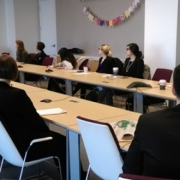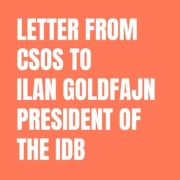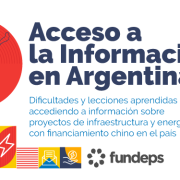Civil society responds to the MICI evaluation
Last April 2021, the Office of Evaluation and Oversight (OVE) of the Inter-American Development Bank (IDB Group) published the Evaluation of the Independent Consultation and Investigation Mechanism (MICI). After the evaluation, the MICI has modified its policy, excluding the clause that prevents the registration of complaints that are part of open national judicial processes.
“Below, we offer a google translate version of the original article in Spanish. This translation may not be accurate but serves as a general presentation of the article. For more accurate information, please switch to the Spanish version of the website. In addition, feel free to directly contact in English the person mentioned at the bottom of this article with regards to this topic”.
The evaluation carried out tried to determine if the MICI is effective and efficient in three areas: (1) the resolution of complaints, (2) the promotion of institutional learning, (3) accessibility, objective independence, impartiality and transparency. Finally, OVE made 5 general recommendations on how the Board, the Bank, and the MICI can improve the application of the IDB’s social and environmental safeguards.
In general, the document identified elements that impede the effective functioning of the MICI, including accessibility barriers, unnecessary limitations to its independence, and a systemic lack of remediation by the IDB Group when projects do not comply with safeguards. Fundeps, together with other civil society organizations, decided to publish a response and send recommendations / comments to the MICI.
Below, we summarize our points of discussion and concern for each of the recommendations made by OVE:
Recommendation # 1 – Implement and improve the Bank’s management system for environmental and social claims: We agree with OVE’s findings that show that the requirement for communities to make prior contact efforts with the Administration is a problematic barrier for access to the MICI. Affected persons who present complaints to the MICI have experienced first-hand the ineffectiveness of presenting certain complaints to the Administration. However, OVE’s proposal to establish a Bank’s own management mechanism is a measure that we consider incomplete. To ensure the effectiveness of the mechanism and the Bank, it would be best to remove the requirement that the communities first contact the Administration.
Recommendation # 2 – Repeal the legal exclusion: The report’s findings on the impropriety of the legal exclusion, and its severe restriction on accessibility, are clear. We applaud the report for mentioning that the legal exclusion should be removed. The role of an accountability mechanism within an institution is unique and different from judicial procedures. A mechanism should examine compliance with the institution’s own standards, a mandate that does not overlap with the courts or tribunals. With the approval of the OVE Evaluation by the Board, the decision to remove the legal exclusion becomes effective as of July 1, 2021. However, the resolution approving the removal of the legal exclusion should be publicized or published. to ensure that the decision to remove this requirement is widely known.
Recommendation # 3 – Strengthen the independence of the MICI: The importance of the independence of the MICI, as well as other accountability mechanisms, cannot be stressed enough. Independence is an essential condition for other attributes such as objectivity, impartiality, and transparency. The report finds the need for the MICI to ensure the approval of the Bank’s Board of Directors before starting the investigations, as a major problem that has generated “situations that compromise the independence of the mechanism.” From civil society we believe that to ensure its independence, the MICI should have the authority to determine when to initiate an investigation without approval from the Board. This is a good practice that, as noted by the report, is adhered to by many other mechanisms. As an alternative to the current policy, to mitigate the detrimental effect on the independence of the MICI, the policy should be updated by specifically and closely outlining the technical reasons for the Board to review the MICI’s decision to initiate an investigation.
Recommendation # 4 – Ensure corrective action when there are findings of non-compliance and associated damage: The Evaluation clearly stated the lack of remedy for cases of verification of compliance being that “they have not had concrete results for the applicants, despite the findings of non-compliance and related damages established by the MICI ”. We have seen this in our case work. The recommendation of the Evaluation so that all the actors – the Board of Directors, the Administration and the MICI – adhere to the practice of consistently providing corrective actions, is a step in the right direction. However, this result would be best achieved with a clear change in the policy that includes points such as: (a) Consultations during the development of corrective action plans, (b) approval of action plans based on their sufficiency, (c) monitoring compliance with action plans, and (d) alerting the Board of Directors in cases of non-compliance with the plans. Finally, while OVE’s assessment documents multiple instances in which communities have been left without remedy, despite compliance verification reports finding a cause of harm in the Bank’s non-compliance, unfortunately no recommendation is provided for these communities.
Recommendation # 5 – Strengthen the internal capacity of the MICI: One of the focuses of the MICI Evaluation of its internal functioning is the dependence on the model of consultants for the staff. The importance of MICI staff in relation to their effectiveness in resolving complaints is evident. The Bank should commit to providing the human and financial resources necessary to implement this change and avoid that the lack of human resources translates into delays during the complaint processes. The Bank should also ensure the increase of its capacity in terms of resources as necessary.
Now, from civil society we consider that public and inclusive consultations are required for the implementation of all the recommendations. Likewise, we believe that the implementation of these recommendations will require changes to the MICI policy. The steps taken to ensure compliance with social and environmental safeguards and accountability in cases of non-compliance should be reported by those affected by the projects (who live and work in the implementation sites). To hear from those affected and their representatives, the IDB and the MICI should consult publicly about their plans to implement the
OVE recommendations.
The MICI plays a fundamental role within the IDB, providing a channel for the people affected by the projects, beneficiaries of the Bank’s work, to file their claims in search of remediation. However, as OVE’s Evaluation makes clear, there are gaps in the current practices of the MICI – and related practices of the Board and Management – that prevent the effectiveness of the mechanism. To ensure the legitimacy of the MICI, the Bank has to act to address these issues fully.
More information:
Internal IDB evaluation raises the need for reforms in the operation of the MICI
Autora:
Agustina Palencia
Contacto:
Gonzalo Roza – gon.roza@fundeps.org










